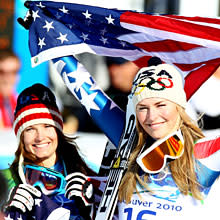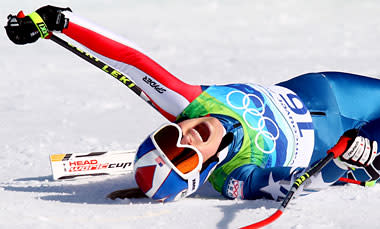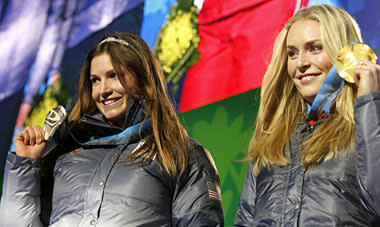Frenemy lines: Vonn seals spot as USA's 'top dog'
Follow Charles Robinson on Twitter at @YahooSportsNFL
WHISTLER, British Columbia – Julia Mancuso was standing on the bottom of the mountain, beaming her California smile into a camera lens. On top of her head sat a trademark tiara – an accessory promoting her designer lingerie while simultaneously eliciting eye-rolls inside the U.S. Olympic skiing family. It was a defining snapshot: Princess Mancuso basking in an intimidating lead in the women's downhill event, while the world looked back up the mountain at Lindsey Vonn, waiting for her to once again take the crown from her teammate.
When people look back at Vonn's first taste of Olympic gold, they'll wax eloquently about Vonn's shin injury and her expectations and Whistler's formidable conditions. They'll spin tales of American dominance, with Vonn and Mancuso finishing 1-2 and setting a new standard in the U.S. women's Alpine program. But they'll be leaving out the defining story, about how it was Mancuso who set the stage for Vonn's greatness. About how a frenemy and teammate helped propel Vonn further than any foreign-born foe. And how when the greatest downhill skier in American history needed a defining challenge, she got it from Mancuso – the woman who had spent several pivotal years not only colliding with Vonn, but beating the bindings off her.
A rivalry that, as U.S. women's head speed coach Alex Hoedlmoser put it, "might be the best thing that has happened to either of them."
Just before Vonn perched in the start gate in Wednesday's downhill, her husband Thomas radioed the defining course report from below. Despite bumpy patches that would send several racers crashing, Mancuso had blazed through her run, pulling into a lead by a sizable nine-tenths of a second. Pressed against some other sloppy runs, it looked like near perfection on an unforgiving course.
The plan had been for Thomas to be with Lindsey at the top of the course, but only in case of nervousness, when she might need a steadying voice in her ear. But Vonn turned her husband back, telling him his presence wasn't required. She felt ready, steady and confident. Now all she needed to know was where the bar would be set. And her husband radioed the reality shortly before her own start: Mancuso had been sharp and fast. She was going to be difficult to beat.
"Julia has had a really great run," Thomas said. "Almost perfect. You're going to have to have an exceptional run to beat that."
Vonn's response was short and to the point: "OK, I got it."
This moment wasn't anything new. Vonn spent the early part of her career struggling to keep pace with Mancuso, a skiing prodigy who made her World Cup debut at only 15 and had spent much of her embryonic stages dominating the junior ranks. While Vonn – then Lindsey Kildow – was searching for a centering force for an often out-of-control style, Mancuso was blowing minds, winning a record eight medals (including five golds) at the Junior World Championships from 2002-2004.
During that time, Vonn and Mancuso maintained a fairly close friendship, doing some of their training together and rising up through the ranks of the U.S. Ski Team. But there was a clear disparity between the two – Mancuso seizing on her talent while Vonn grasped to get a handle on her own.
And at no point was the gap between them more clear than one offseason early in their World Cup careers, when a teenaged Vonn spent some time with Mancuso's family in their home in Lake Tahoe, Calif. Avid bike-riders, Mancuso and her father, Ciro, invited Vonn to join them on a rigorous pedal through the mountains near their home. Vonn joined them despite having little biking experience, and not long into the trek, found herself more than five miles behind Mancuso and her father, who had left Vonn behind.
It was an indelible moment for Vonn – one that became a pivotal point in her career. Here she was, expected to compete with Mancuso on an international level, and she was getting utterly embarrassed on a bike ride. When Vonn tells the story now, you can still sense some of the disappointment in her demeanor, as if she never really got over the experience.
"I felt like a fool," she recalled back in November, when sharing the tale with a visitor.
But that embarrassment also delivered a watershed moment. Vonn realized her training was sorely lacking. And to beat Mancuso – who she desperately wanted to beat after the biking experience, she was going to have to reshape her entire body. And over the next eight years, she did just that, developing one of the toughest training regimens of any skier on the World Cup. In turn, she developed wicked lower-body strength and endurance that helped her flip the hierarchy that existed between her and Mancuso. By 2007, she married Thomas and began asserting that dominance, taking the lead role on the U.S. Ski Team and becoming the shining star over even Mancuso.
"That bike ride was kind of one of her first awakenings that she had," Thomas Vonn said. "As an athlete, you kind of have these points where you realize what you've been doing probably wasn't good enough and you need to do more. That was certainly one of those times where she was like 'OK, Julia is my competition and she just dropped me on a bike ride. I have no chance against her. How am I going to beat her in a ski race? I've got to change something here.' "
Of course, many things changed. Despite her crash before the 2006 Winter Games in Torino and the disappointment of finishing off the podium in all her races – and in spite of Mancuso capturing giant slalom gold in those Games – Vonn's dominance on the World Cup rocketed her to the top of the U.S. team. Despite Mancuso having medaled previously and also being a five-discipline skier, it was Vonn who was toasted as America's next big thing in Alpine. Vonn had the World Cup success, while Mancuso largely flopped on the international circuit after her '06 gold. In turn, it was Vonn who NBC chose to build its coverage of the Vancouver Games around while the media fawned over her pristine reputation and perfect looks.
All the while, the relationship between Vonn and Mancuso featured some noticeably prickly moments. Vonn showed some subtle disdain for Mancuso's traveling on her own private bus during some European World Cup events, and splitting off from the U.S. Ski Team for summers and training in Hawaii. Meanwhile, Mancuso has appeared to occasionally take some gentle swipes at Vonn, talking about how she doesn't seem to enjoy skiing and can often treat it like "a job" rather than a lifestyle. And of course, both have at times made note of the other's lifestyle: Vonn painted as the married homebody; Mancuso billed as the single, underwear promoting wild child.
But both remained undeniably skilled. That much was clear Wednesday, as Mancuso jolted everyone out of their seats while taking a commanding lead from her 10th-place position. But when Vonn's downhill charge began, you could see the fruits of her labors as a workout phenom. She immediately began shaving precious hundredths off Mancuso's time, snapping through turns, holding a tight line, keeping her tuck through rattling bumps and corners – all while still managing to ski loose and free. It was a homage to what makes her best – skiing loose and fast, but still so clearly in control.
When she crossed the finish line, Vonn immediately swiveled her head and saw her name locked into the No. 1 spot on the digital clock, .56 seconds ahead of Mancuso. She raised her arms and gave an elated scream, and once again, Mancuso had been knocked from her perch – tiara and all – by the woman whose reputation for work and diligence has gone unmatched. When the camera caught them standing together afterward, Vonn was jovial and waving, while Mancuso had her arms crossed in what appeared to be disappointment. It was a cross-section of "Minnesota Nice" vs. "California Cool."
Hoedlmoser noted the moment, nodded and said: "Of course there is a real rivalry there. They have been pushing each other all their lives. But the respect is there, too. They have respect for each other. That is real."
Afterward, both exchanged pleasantries in their news conferences, being brief and diplomatic when talking about the other. Mancuso said she was "psyched" to be on a two-American podium, calling Vonn's approach to skiing, "Just really analytical. She's spends a lot of time with her husband trying to perfect things, almost like a perfectionist."
In turn, Vonn admitted, "Julia and I have definitely had different paths and different methods of getting to where we are. But I'm really glad that we're both on the podium today."
It was a two-star moment in a leadership system that typically orbits around one face, one personality. For now, that's Vonn. She's got her gold. She's got her World Cup titles, and she has cemented her claim as the best female skier in the history of the United States. But Mancuso will always have played a role in that rise. And the fact that Vonn gained her first Olympic gold at the expense of Mancuso only illustrates how their careers and successes have had a certain gravitational pull toward each other.
"They all want to be the top dog," said Thomas. "[But] there's only so much glory you can have on the U.S. team, and it's not going to be spread across two people. There's going to be one. It's how it works in anything. And Lindsey is the top dog on the U.S. team."

 Yahoo Sports
Yahoo Sports 



